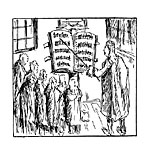
Are “White Lies” Ever Permissible?
THE INTRINSIC TELEOLOGY OF HUMAN COMMUNICATION
On its face, the debate seems insignificant to the point of banality: Can a lie ever be morally justified? Is there such a thing as a “white” lie? Despite the appearance of triviality, the matter cuts to the heart of our moral heritage. Christendom has long considered the natural law to be written on the hearts of all men, accessible without divine revelation or special grace. This classical tradition asserts that what makes an act good is that it contributes to our happiness, the flourishing of our nature. In practice, this means that acts must always satisfy natural appetites, that we must use our natural powers to achieve those powers’ natural ends. In orienting ourselves this way — toward the goods to which our nature strives — we perfect ourselves, flourishing as much as we can. With this flourishing comes happiness.
Alternatively, the natural-law tradition asserts that it is always wrong to direct our nature away from its fulfillment by using a natural power in a way contrary to its inbuilt aim. From this central principle, all the remaining elements of moral analysis are determined, particularly the appropriate circumstances and intentions of an act.
Hence, if there were a single act that remains good despite its being used contrary to its inbuilt aim, the central tenet of the natural-law tradition — as it has been understood for over a millennium — would need to be scrapped. Yes, a lot is riding on what may otherwise appear to be banalities. New theories of morality would need to be proffered lest we despair of ever attaining a deep understanding of natural human goodness this side of the Eschaton.
Innovators among us see the terrain differently. When a theory runs counter to their judgment, the theory must be mistaken. Castles built on sand will always fall, they might say, and perfect moral theorizing is an impossible task; therefore, the tidy natural-law system must be revised.
You May Also Enjoy
Young people are hungry for a faith that makes sense and — although they might deny this — for a faith that makes demands of them.
The “new spirituality” is an ugly caricature of the truths of union with God set forth by the Church, her saints, and her Doctors.
Dissent has long been noisy, abrasive, and antagonistic. Dissenters seldom pause long enough to consider that they may be in error.

